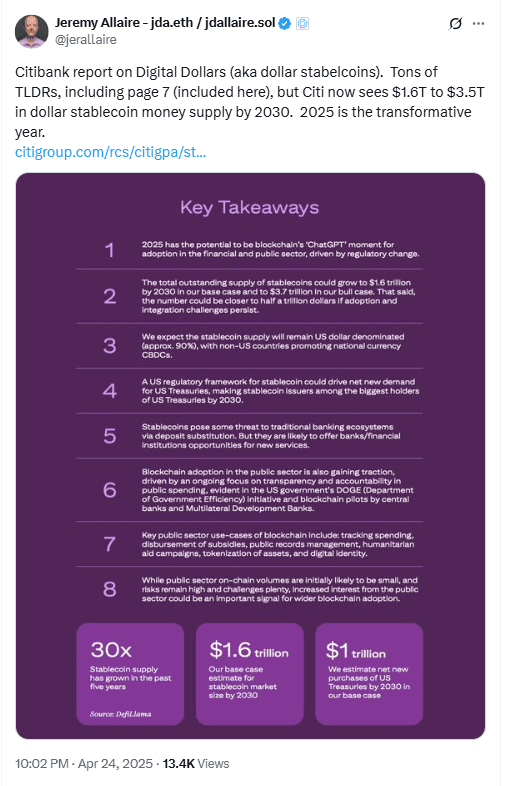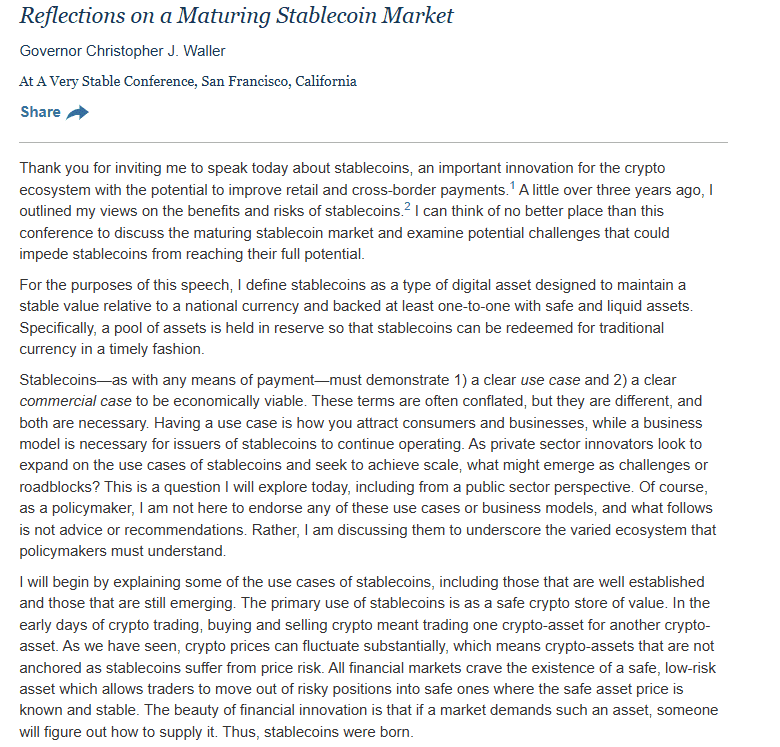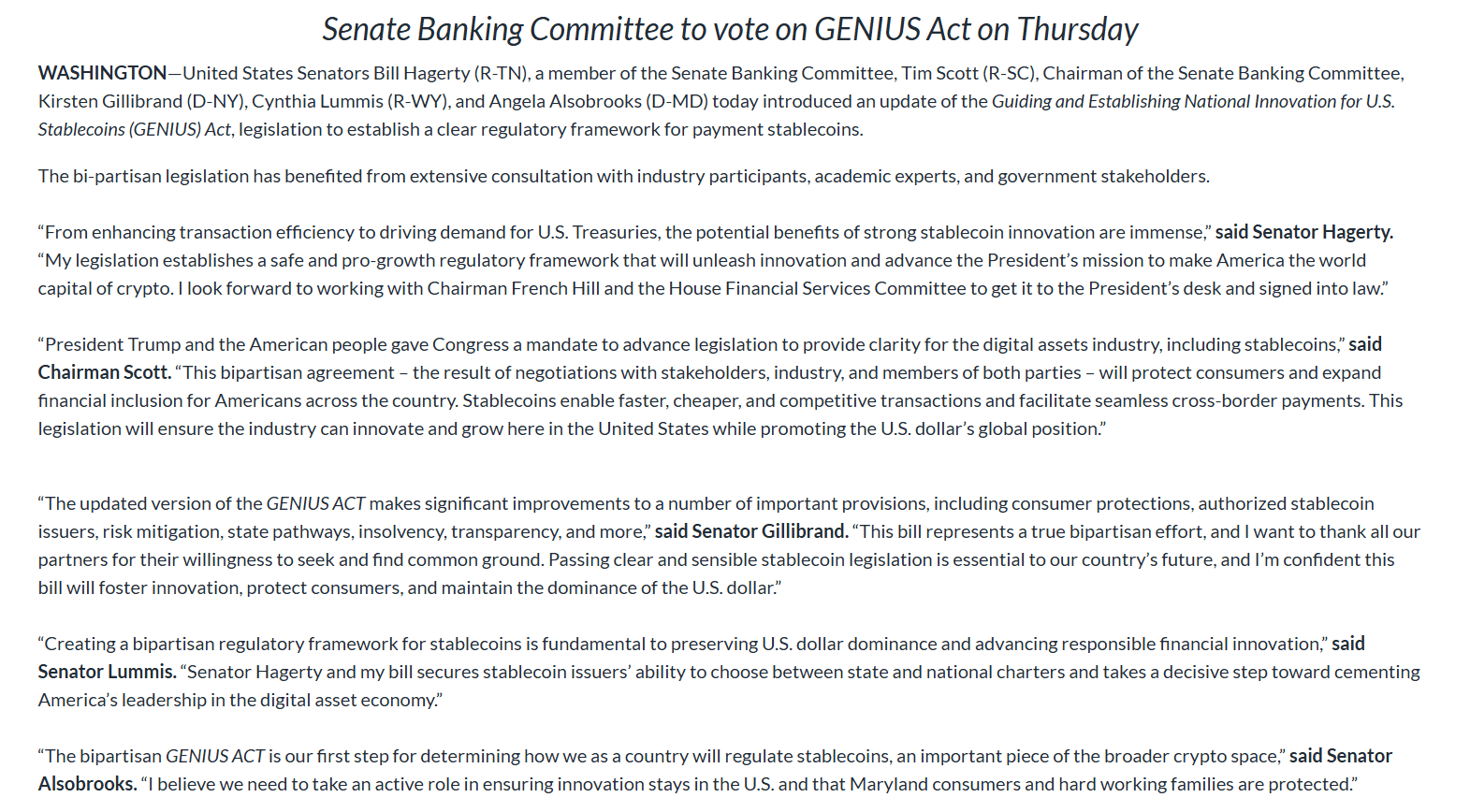The stablecoin market cap has reached nearly $240 billion, according to DeFiLlama. This figure reflects a $5 billion increase over the past week, marking a 2.18% rise in seven days and 2.62% over the past month.

Tether USDT remains the leading stablecoin with a 61.92% share. Other top tokens include USD Coin (USDC), Ethena’s USDe (USDe), and MakerDAO’s Dai (DAI). These stablecoins dominate the digital payments and decentralized finance sectors.

The Citigroup stablecoin forecast expects the total supply to hit $1.6 trillion by 2030 under its base-case scenario. A more favorable outcome could raise that to $3.7 trillion. However, without clearer regulations, the market might plateau around $500 billion.
Active Stablecoin Wallets Reach 30 Million
The number of active stablecoin wallets grew 53% year-on-year, climbing from 19.6 million in February 2024 to 30 million by February 2025.
During the same period, the overall stablecoin supply rose from $138 billion to $225 billion—a 63% increase. This shows expanding user engagement across trading, remittance, and payment platforms.
Federal Reserve Governor Christopher Waller noted that U.S. dollar-backed stablecoins could support the dollar’s international role. His statement highlighted the growing role of stablecoins in global finance.

Mastercard Strategy Supports Merchant Payments
Meanwhile, Mastercard launched a full-stack stablecoin strategy covering wallet support, card issuance, on-chain remittances, and merchant settlement. The company partnered with Circle, Paxos, and Nuvei to let 150 million merchants accept digital payments.

Mastercard also rolled out the OKX Card in partnership with the crypto exchange OKX. This card allows spending stablecoins directly for retail users.
Meanwhile, Stripe plans to introduce its own USD stablecoin. The company aims to support stablecoin payments outside the U.S., U.K., and Europe.
GENIUS Act Pushes Regulation in U.S.
The GENIUS Act, introduced in the U.S. Congress, proposes federal rules for stablecoin issuers. The bipartisan bill aims to offer legal clarity and encourage adoption by banks and financial institutions.

Standard Chartered linked regulatory clarity to stablecoin growth. It said a clear legal framework could raise the stablecoin market to $2 trillion within three years. This could also impact demand for U.S. Treasury instruments and support the dollar’s global use.
The GENIUS Act is still under legislative review, but its backing signals progress toward stablecoin oversight in traditional finance.
UAE Plans Dirham Stablecoin With Central Bank Support
In Abu Dhabi, the UAE is moving forward with a dirham-backed stablecoin. The project is a collaboration between ADQ, International Holding Company (IHC), and First Abu Dhabi Bank (FAB), developed on the ADI blockchain.

The UAE Central Bank supports the initiative. The stablecoin will target retail payments and machine-to-machine use cases, including automated and AI-powered transactions.
Moreover, FAB will issue the UAE dirham stablecoin after receiving regulatory clearance. The ADI Foundation stated that its blockchain offers transparency and scalability.
Russia Debates Ruble-Backed Stablecoin Features
At the Blockchain Forum in Moscow, Exved exchange CEO Sergey Mendeleev proposed a ruble-backed stablecoin. He outlined seven technical requirements and called the proposal a “Tether replica.”
Additionally, Mendeleev’s version suggested anonymous transfers and no Know Your Customer (KYC) checks. Notably, these features conflict with Russia’s current financial laws. He did express interest in overcollateralized models like MakerDAO’s Dai but questioned their legal feasibility.
